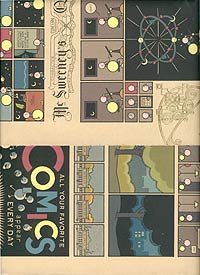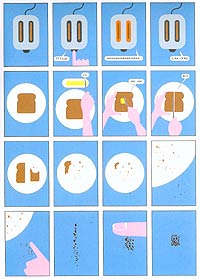 Yes, It's Rightside Up: McSweeney's #13 as designed by Chris Ware
Yes, It's Rightside Up: McSweeney's #13 as designed by Chris Ware |
Of course Chris Ware is involved. Ware, the meticulous, aesthete creator of "Jimmy Corrigan: Smartest Kid on Earth," guest edited the hard covered book, taking over for regular "McSweeney's" editor Dave Eggers ("A Heartbreaking Work of Staggering Genius.") Ware's influence can be seen even before you tear off the shrink-wrap (an ironic touch given Ware's disdain for polybagged, untouchable collector's comics). The cover appears deconstructed. And it is, sort of. The dust jacket unfolds into a 29 x 21 3/4 inch, poster-size, full-color work about God, man and comic strips. The verso displays Gary Panter's giant mandala of cartoon and fine-art characters through the ages. Ingeniously, when wrapped around the book, the poster forms a pocket on the front and back in which sit — surprise! — two mini-comix by John Porcellino and Ron Rege Jr. In a single package, "McSweeney's" explodes conventional notions of what comics should look like.
The book itself stays true to Ware's high standards, being printed on heavy paper stock and in full color for at least half of the works. The contributors are a jaw-dropping list: every single major North American cartoonist of the last two decades, plus several key historical artists, some newcomers and even a few prose pieces by the likes of John Updike, Chip Kidd ("Peanuts: the Art of Charles M. Schulz") and Glen David Gold ("Carter Beats the Devil"). The works have been loosely organized by genre. Early in the book appears what may be considered the world's first comic strip: Rodolphe Topffer's 1839 "The Adventures of Obadiah Oldbuck," about a despondent bachelor who perpetually fails at both love and suicide. A major revelation, in its charming way it lays the groundwork for both the jollities and existential torments of comix to come. This becomes the first in a strange triptych of early suicide-related strips. Other genre groups include fiction, journalism, biography, autobiography and as Ware says in the introduction, "the uncategorizable."
 A page from Richard McGuire's "ctrl"
A page from Richard McGuire's "ctrl" |
The intelligence and thoroughness of the book's selections should appeal to novices and comixcenti alike. Several of the works have appeared elsewhere, such as the excerpt of Chester Brown's "Louis Riel," the 2003 biography of a 19th century rabble rouser, or the snippet of Charles Burns' inky teenage horror comedy "Black Hole." Other superstars have brand new work. Robert Crumb, the underground pooh-bah, provides one of his patented war-of-the-sexes pieces, "The Unbearable Tediousness of Being," where a dull nebbish attempts to woo a distracted, hard-nippled Amazon-like woman. Further on appears the wordless examination of man's attempts at ordering nature, "ctrl," by Richard McGuire, an artist who virtually disappeared after creating "Here," a singular, diamond-like piece of brilliance almost fifteen years ago. The funniest piece belongs to Joe Matt, who's autobiographical "Toronto, Ontario. Canada" details his obsessive onanism and general poor living with horrifying candor. The breakout "unknown" artist is David Heatley, who provides poignant and funny vignettes of his father in "Portrait of My Dad." Other contributor are a who's who of indy comix: Lynda Barry, the Hernandez Brothers, Adrian Tomine, Julie Doucet, Dan Clowes, Art Spiegelman, and on and on.
Added up, it makes "McSweeney's" #13 the finest comic anthology ever put together. Ware's talents as designer and editor have turned "McSweeney's" issue 13 into a work of extraordinary depth and beauty. It culminates his efforts at moving the public's idea of comic books from consumable juvenilia to museum-worthy artworks that still retain their puerile edge. (Ware's work has appeared in both the 2002 Whitney Biennial and Cooper-Hewitt National Design Museum.) This will be the standard that future books must meet.
McSweeney's #13 can most easily be purchased through web-based bookstores or from McSweeney's website.
